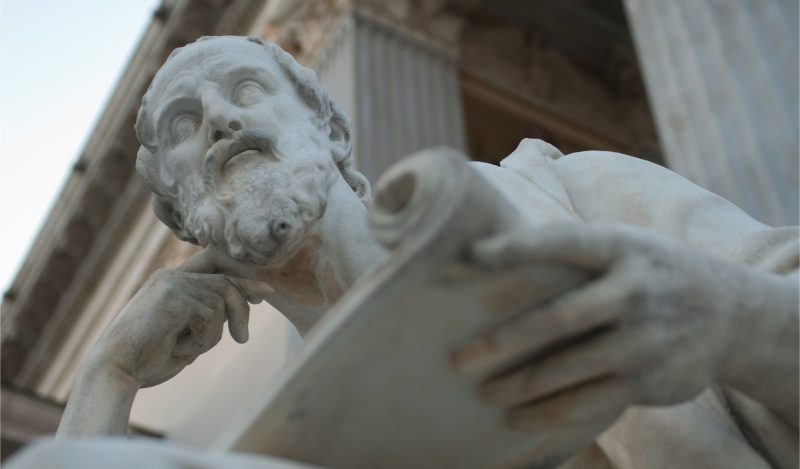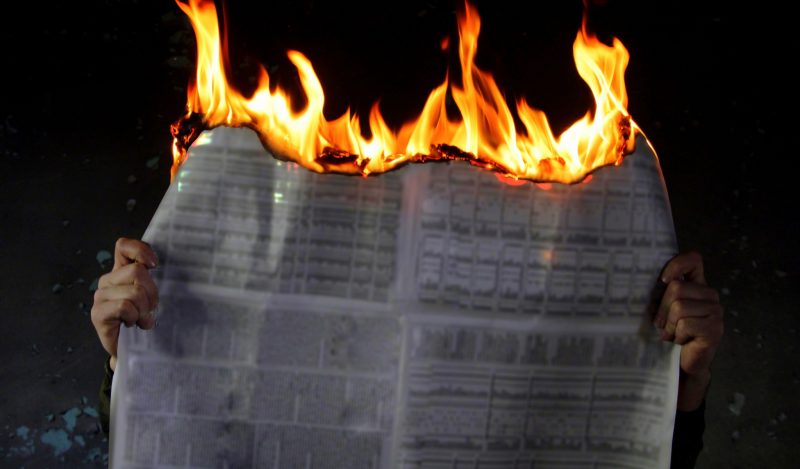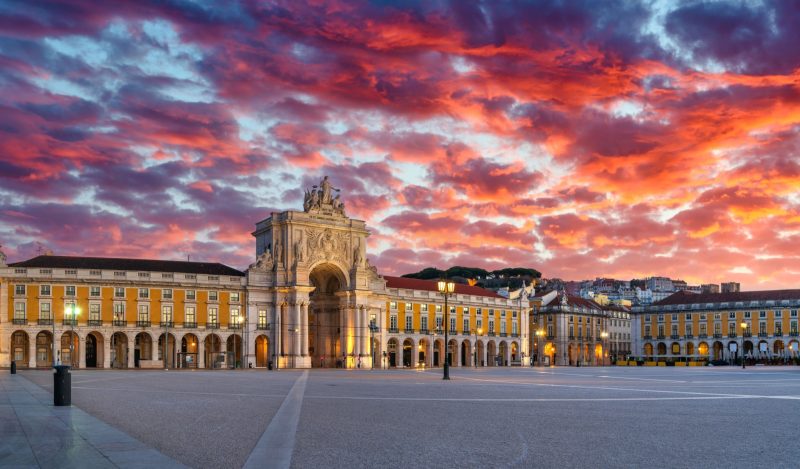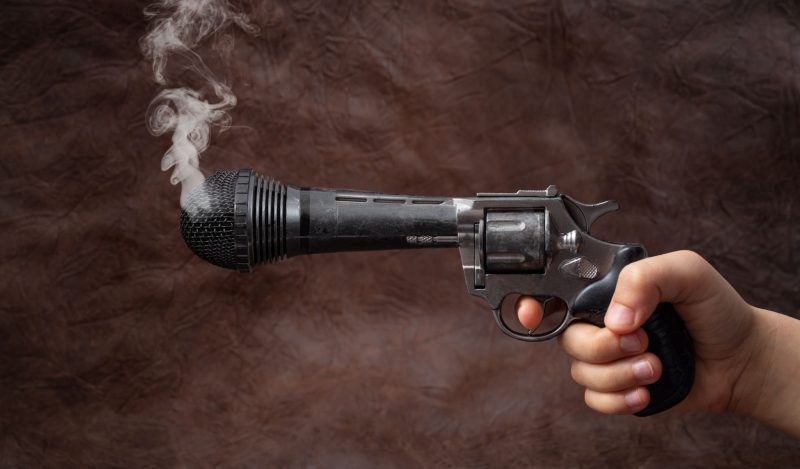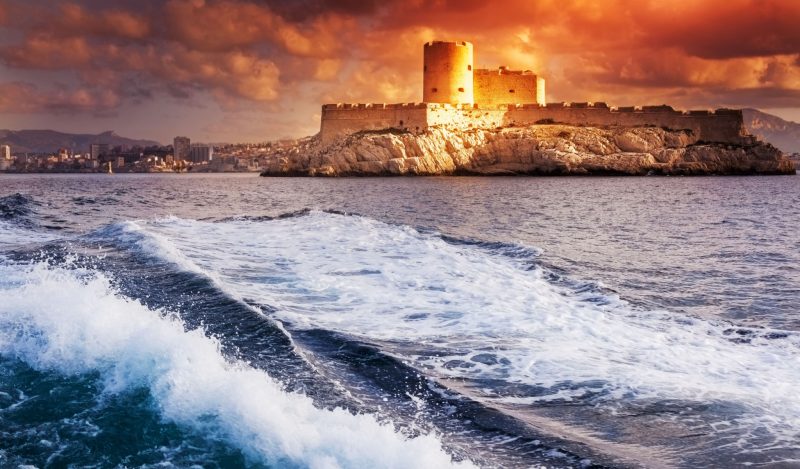Part of the astonishing power of Noam Chomsky’s 1967 essay The Responsibility of Intellectuals (New York Review of Books) was his courage to name names of top intellectuals who enlisted their main talents in service of ruling-class duplicity and social destruction at the hands of the Garrison State.
I’m not going to do that, though many of us have been keeping documents for two years that chronicle the intellectuals who have been apologists for the most dramatic expansion of exploitative power in our lifetimes, one that has threatened to kick off a new dark age. The time for naming names – and perhaps it is not necessary – is not yet.
Still, let’s reflect on Chomsky’s method. Here were half a dozen of America’s best and brightest, the people daily interviewed on TV, the minds quoted in the media, the people given the grants and the awards, the celebrated geniuses of the age.
Chomsky proved them all to be ruling-class hucksters willing to tell any lie to protect themselves and their friends. The essay remains as a clarion call for intellectuals to stop with the nonsense, the careerism, the coverups: in short, he said, stop serving the ruling class with such slavish obeisance. He didn’t persuade them (he knew he would not) but at least a generation of students and citizens, upon reading his mini-treatise, had the scales fall from their eyes to see these people for what they were doing.
The context: The Vietnam War was going full tilt under the cover of waging some ideological war on Russia, but the victims were poor peasants in North Vietnam who were subjected to an unrelenting barrage of bombs, rockets, napalm, and cannon fire, not to mention the American soldiers dragged into that ghastly conflict to be maimed and killed. Two years after his essay appeared began the first conscription since World War Two. The warfare state fully kidnapped young Americans to send them to a far-flung foreign war conceived of and conducted by expert technocrats who had a penchant for never admitting error, and certainly never apologizing for the carnage they both inspired and covered up.
The leading public intellectuals of the time excelled at talking points that reflected wartime priorities, all helping to manufacture public consent. Chomsky in those days was a rare breed, a genius and maverick in his profession who used his prestige and privilege to tell the truth. He believed that it was his moral duty. What else is the point if not that, he often asked. It’s true that people in general have a responsibility to stand up to grotesque immorality as deployed by their own governments, their own rulers to which they pay taxes, but the intellectuals have an even greater responsibility:
Intellectuals are in a position to expose the lies of governments, to analyze actions according to their causes and motives and often hidden intentions. In the Western world, at least, they have the power that comes from political liberty, from access to information and freedom of expression. For a privileged minority, Western democracy provides the leisure, the facilities, and the training to seek the truth lying hidden behind the veil of distortion and misrepresentation, ideology and class interest, through which the events of current history are presented to us. The responsibilities of intellectuals, then, are much deeper than what Macdonald calls the “responsibility of people,” given the unique privileges that intellectuals enjoy.
So he spoke out. And he didn’t stop, despite all the attacks. His point was not merely that intellectuals should exercise responsibility; rather, his point was that intellectuals are in fact responsible for the devastation. (I’m going to completely overlook his recent and highly tragic and confused endorsement of vaccine passports. An intellectual with a career spanning 60 years will make mistakes, sometimes big ones.)
I returned to this 1967 essay because of recent personal exposure to multiple disturbing essays, interviews, profiles, and podcasts with intellectuals whom I absolutely know for certain are better than they are willing to admit in public. In private, many of them are friends of mine. We see each other at events, shake hands, speak exuberantly, affirm the same general values, and so on. We are polite. Some of them, many of them, claim to be dedicated to human liberty and rights. Indeed, they are well read in the topic. And yet, they change their message once in public eye. The ideals vanish and are replaced by predictable media-ready talking points.
This is not recent. It’s been going on for two years. There are several poses they take. Some just pretend like nothing significant is happening, even though they know otherwise. Some merely downplay the obvious reality, calling house arrest and brutal business closures “mitigation measures,” or describe compulsory injections as normal public health. Some go all the way to parrot the line of the day, whatever it is, while decrying the rabble that resents the impositions as primitive and ignorant. All of them have perfected the art of discerning and articulating the ethos of the day as defined by ruling-class priorities.
Some are on the left. Their values have traditionally been about rights and democracy, free association and non-discrimination. And yet in this case, they have lent their voices to policies that fly in the face of all these values and institutionalize a coercive caste system enforced by large corporations and imposed by the managerial elite they once decried. And they have looked the other way or even celebrated as dissident voices have been censored and canceled.
Others are on the right: they have favored tradition and law, republican order and deference to settled ways, and yet they turned a blind eye to the wild extremism of an unprecedented global experiment. And they did this out of fear but also because the entire shocking mess began under Trump. They fear that calling it out will limit their access to venues and parties and social circles, plus it will give too much satisfaction to Trump’s enemies who are also their own enemies. It took this tribe far too long to step up and say what is true.
The highest burden of responsibility falls on those who consider themselves apart from both left and right, the people once called liberals but now generally known as libertarians. They have elevated freedom and individual rights as first principles of public life. It is they on whom we counted to stand out and speak up. But we watched with amazement as many among them deployed astonishing intellectual acrobatics designed to justify and defend lockdowns and mandates, using high theory in ways that can only be described as sophistry. Imagine that: intellectuals who made their mark as critics of the state becoming marionettes for that which they have long purported to oppose.
Why should any of this matter? Because intellectuals can make a difference. One might consider a conjectural history in which principled voices from the left, right, and libertarian worlds united early on, perhaps from the first sign of lockdowns in January 2020, and said this will not stand. This violates human rights. This contradicts the whole history of public health. This is anti-democratic. This contradicts equality, tradition, constitutional law, freedom, human rights, property rights, free association, and every other principle that built the modern world. Whatever our disagreements, we can surely agree that in order even to have debates on the particulars of policy or philosophy, we need a functioning society and economy in order for them to be realized.
Had that happened, the lockdown and mandating regime might not have had such a clear path. Clear and courageous opposition from many corners might have alerted so many confused people that this is neither normal nor tolerable. An outspoken and broad intellectual opposition might have taken away from the regime any pretense of legitimacy, and inspired many people who had an intuitive sense that something was very wrong to stand up and speak out.
With very few exceptions – and they too deserve every credit by name – what we got instead was silence. You can say that this was understandable in the first weeks, when it truly seemed as if an enormously scary germ without precedent was coming to kill us all, like in the movies, and so governments needed to be unleashed to deal with it just temporarily. But as the months went on, and the failures of these policies began to mount, it was still eerily quiet. The cost of silence was already sunk but the silence went on, and the regime of censorship began to build. The intellectuals who decided to sit this one out continued to do so. Others decided to offer up their voices in defense of a policy that was clearly not working.
The problem runs deeper than mere silence. Everything about lockdowns and mandates were constructions by intellectuals themselves. Thus do they bear responsibility, to deploy Chomsky’s term. The modelers and coercive controllers concocted their scenarios as early as 2005 and their ranks grew year by year: in research labs, government offices, universities, and think tanks. They became so engrossed in the world they created on their laptop screens that their imaginations came to outpace any understanding of history, cell biology, public health, much less human rights and law.
They held endless conferences and sessions over 15 years to hammer out the plan for future lockdowns. One can only imagine being present at them, watching as the gnostic elite thrill at the prospect of managing a pathogen with only these credentialled few at the commanding heights. How many present in the rooms wondered if this is right, if this is workable, if this is consistent with liberal ideals? Did anyone speak up? Did anyone raise fundamental questions of freedom vs tyranny? Or instead did they all notice the flow of funds increasing, their ranks growing, the ascendancy within the new profession, the cheers from the minions of the administrative state, and confuse all these signs of professional success with intellectual rigor and truth?
In light of Chomsky’s challenge, we should also consider those who stood out in these hard times, departed from their colleagues, dissented from the consensus, and dared to risk it all to tell the truth. We should think first of the authors of the Great Barrington Declaration. It is they who showed the way, and gave many more the courage to come forward and speak. Many of these people lost their jobs. They’ve been called terrible names. They have faced trolling, doxing, denunciation, smears, and far worse.
They all deserve recognition for what they did. As for those who stayed quiet, lent their voices in support of egregious policies, ran with the herd of their tribe rather than speak out, Thomas Harrington, himself a prestige humanities professor, has some choice words:
Are you as a member of the well-educated Western elite class prepared to explore the possibility that members of the sociological cohort to which you belong are capable of highly organized evil and deception rooted in a deep disdain for the core humanity and inherent dignity of all people?
Are you open to imagining that people—to borrow a phrase much-loved in certain circles— “who look like you,” live in “nice” neighborhoods like you, and want all the markings of the good life for their children like you, are also capable of monstrous deeds and the propagation of extremely damaging herd-induced stupidities?
Do you ever think of using the knowledge of history your prestigious education might have afforded you for something other than establishing favorable comparisons with the past that prop up the idea of Western man’s triumphant march of progress and, of course, your sociological cohort’s starring role within it?
What was designed by intellectuals must also be debunked and dismantled by them, else they risk permanently discrediting the entire endeavor of the life of the mind. As Harrington says, the stakes are very high: “The manner in which the majority of us choose to respond to it will go a long way toward determining the shape of the world our children and grandchildren will inherit from us.”
Yet there is another step. ”Peace, if it ever exists,” wrote Julien Benda (1867-1956), “will not be based on the fear of war, but on the love of peace.” So too for a society without emergency powers, without lockdowns, without mandates, without the possibility of universal quarantine, closures, and forced segregation by class.
These are things to be feared and against which we should all fight, with intellectuals reversing course and leading the way out of the abyss. The rebuilding will also require what currently seems like the most implausible thing of all, a new generation of intellectuals who fall in love with freedom and then have the courage to defend it.
Published under a Creative Commons Attribution 4.0 International License
For reprints, please set the canonical link back to the original Brownstone Institute Article and Author.
